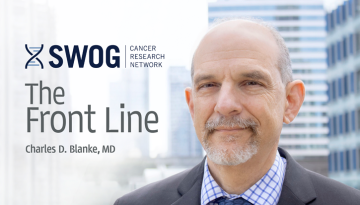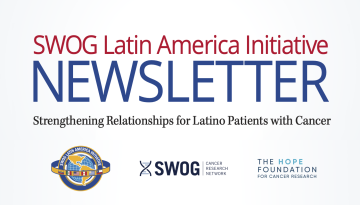Accrual Core Team Exemplifies Collaboration
In December of 2014, 75 people came together at National Cancer Institute headquarters in Bethesda to talk about the future of clinical trials. With the federally funded cancer research establishment recently recast as the National Clinical Trials Network, and with precision medicine on the rise, the question on the table: How can we work together to get more cancer patients enrolled onto studies?
The investigators, advocates, site staff, and trial administrators talked. They talked about the problems. Too much fear and distrust. Not enough patient awareness. Not enough physician time. They also talked about solutions. One was the formation of the Accrual Core Team (ACT).
The NCI convened the 30-member ACT in April 2015. In October 2015, the team approved their charter. Since then, they’ve been going full steam. The ACT aims to raise broad awareness of clinical trials, to provide a forum to discuss challenging studies, and to monitor accrual across the NCTN and the NCI’s Community Oncology Research Program. It includes two subcommittees. One is studying eligibility requirements, which themselves have a major impact on patient participation. The other is creating an inventory of accrual strategies and methods for seeking feedback on active trials from the doctors, nurses, and research associates on the front lines.
The ACT truly has the potential to be powerful. It’s already crosscutting. On one monthly call, you will find participants from across the NCTN, ranging from doctors practicing at major academic cancer centers and at community hospitals, to research site staff, patient advocates, and network administrators, to staff leaders from NCI’s Clinical Therapy Evaluation Program (CTEP). On every call, the team dissects a tough trial – one that offers unique challenges to accrual – and suggests ways to enroll more patients. SWOG itself has already benefitted from this brain trust. A lung cancer trial and a bladder cancer concept have both gotten time in the ACT spotlight, and both were significantly improved as a result.
I spoke today with my executive team about creating a process for prioritizing requests to present SWOG trials to the ACT. We’re working on it. In the meantime, if you have questions, contact ACT member and SWOG Recruitment and Retention Manager Karen Anderson at karena@crab.org. CTEP staff that drove formation of the team – Andrea Denicoff, Holly Massett, and Grace Mishkin – should be applauded. Thanks also to Vinita Gotting, the team’s able administrator. It’s early in the game, but I predict the ACT scores big.
Other Recent Stories



